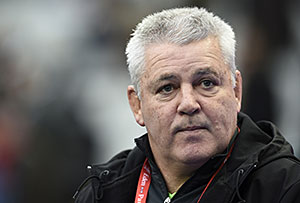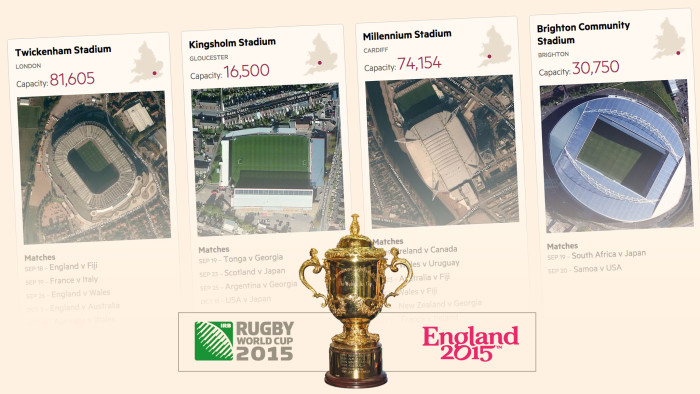Rugby World Cup 2015: England look to restore pride; Wales have power - seek subtlety

Roula Khalaf, Editor of the FT, selects her favourite stories in this weekly newsletter.
Hosts matter to World Cups. If they go out too early the event starts to feel like a party whose host has gone to bed. But if they go all the way, it can become a national jamboree, creating excitement far beyond the hard core of aficionados.
Rugby has generally been fortunate. The impact of the earliest departure, by Wales in the quarter-finals in 1999, was diluted because both semi-finals were played, memorably, at Twickenham.
Every other host has survived at least to the semi-final, ensuring their presence — even if only in the perennially undesired role of third-place match contestant — through to the final weekend. Three of the seven have been winners, while two more reached the final.
This high success rate has a north-south divide. All four southern hosts have reached the final, with only Australia in 2003 failing to win the Cup. Meanwhile, of the three European hosts just England has made it all the way, in 1991.
That team’s successors, 24 years later, will be expected to at least match that performance. England after all have a decent World Cup record, with the victory of 2003 and another final in France in 2007. They are one of only three teams to have beaten the All Blacks since the 2011 World Cup, and by much the largest margin, 17 points at Twickenham in 2012.
The draw guarantees that England will play all of their major matches at Twickenham — a stadium that has appeared to confer greater home advantage than almost any other. If they can win their qualifying pool, England would be in what looks likely to be the less demanding half of the draw — away from New Zealand and South Africa.
But getting there will be tough. Home advantage is balanced by being in quite possibly the toughest pool in World Cup history. England must see off at least either Australia or Wales, as well as Fiji, who are not to be dismissed.

Responsibility for ensuring England survive to the later stages is in the hands of coach Stuart Lancaster and skipper Chris Robshaw. Having swept up after the debacle of the 2011 tournament, Lancaster and Robshaw are a down-to-earth, transparently decent duo whose achievement has been to give English rugby a likeable face and insulate it against accusations of arrogance.
Lancaster’s chief virtue in late 2011 was, like that of England’s future World Cup winner Clive Woodward when appointed in 1997, the simple one of being available when more obviously qualified candidates were not. He had the additional advantage of already being within England’s structures as head of player development and coach of the second-string Saxons. Robshaw had only a single cap, so was untainted by events in New Zealand.
Lancaster’s first concern was to restore English rugby’s standing and self-respect. In turn, England’s selection process has become more stable and consistent. “You can’t have a strong team without having a strong culture. I should say it is what I think about most,” he says.
Lancaster may be a lucky coach. The circumstances of his getting the job suggest this, as do some events of the past year. The injuries that ruled key players out of the Six Nations championship forced changes that proved beneficial.

It seems highly unlikely that Jonathan Joseph, the outstanding midfield attacking force during the championship, would have made it into the team following a three-year absence without the injury to Manu Tuilagi (since ruled out of the World Cup after being convicted of assault).
Bath’s fly-half George Ford was established as a first choice, but the injury to his reliable predecessor Owen Farrell forced a clearer commitment to Ford.
The outcome of his and Joseph’s introduction was that England’s attack flowed as it had not done since Woodward’s era. Ford in particular appeared to offer greater creativity than even Jonny Wilkinson. The capacity for surprise might be the extra element England were missing.
England habitually field a pack of tough, competitive forwards. Even at their lowest points in the 1970s, Wales captain John Dawes commented: “They have a great capacity for winning the ball. But not much for using it.”
The hint of that old failing was swept away when England scored 18 tries during the 2015 Six Nations. The failing they could not eliminate, however, was a tendency to fall just short.
Lawrence Dallaglio, a 2003 World Cup winner, commented in July that the current England crop has not had the formative experience of his generation. Nor has Lancaster’s group managed anything in the way of failure like the inverse Triple Crown of Grand Slam-thwarting final day defeats suffered by England at the hands of Wales, Scotland and Ireland between 1999 and 2001.
However, a team that has had an 80 per cent winning record over four Six Nations seasons, but has only a single Triple Crown and an all-time record four second places to show for it, knows about disappointment.
What it does still seem to lack is the ability to eliminate, or at least minimise, the bad days. Yet it compares favourably with two of England’s earlier World Cup runners-up. The team of 1991 had a steamroller pack, but enmeshed itself in a tactical straitjacket, while that of 2007 did well to get so far.
Where they do lose out is by comparison with the World Cup winners of 2003. As Lancaster’s mentor Bill Beswick has pointed out, “from good to great is the toughest job of all.” Woodward’s team went to the World Cup having ticked almost every box for contenders.
To suffer by that comparison is no disgrace. So would all but a handful of national teams in European rugby history. This team could win the World Cup, but it would be a pleasant surprise. An addition to that long and tantalising list of second places seems rather likelier.
Wales: Ample power, less subtlety

Wales could reasonably blame World Rugby for a pool stage draw that has landed them alongside two other teams from the top six of the world rankings. It seems perverse, for instance, to make the draw for the finals in December 2012, little more than a year into the four-year tournament cycle.
It also makes no obvious sense to base that draw on world rankings in which poor autumn friendly results turned Wales out of the top eight, even though their most recent competitive outings were a run to the semi-final of the 2011 World Cup and a Grand Slam in the 2012 Six Nations.
The rules might be confounding, but Wales knew them. And that miserable run in November 2012 typified an abysmal record against teams from the southern hemisphere. Since the 2007 World Cup, Wales have had two wins out of 28 matches against Australia, New Zealand and South Africa — easily the worst record of any of the former Five Nations.
Yet Wales have done well in Europe, with three championships, two Grand Slams and a winning record against everyone except England, with whom they are 5-5.
With his record at Wasps, where he won two Heineken Cups and multiple English championships, there is nobody better than Wales’s Warren Gatland at coaching Europeans to beat other Europeans.
The New Zealander has found beating teams from the southern hemisphere another matter. Admittedly nobody usually beats the All Blacks, who are 37-2 against the Five Nations over this period. Also, Wales’s single win in 10 matches against South Africa at least compares well with England’s single draw in seven.
The FT’s guide to the 2015 Rugby World Cup

The big men are back. The world’s best 620 players (minus the infirm and overlooked) have assembled across England and Wales to contest the eighth world championship. View our interactive guide.
Read more
But it is Australia, the team that gives other European teams hope, who give Wales nightmares with 10 consecutive defeats since the last Welsh win in November 2008. And it is Australia whom Wales must play at Twickenham on October 10. There is unlikely to be much in it. Australia’s combined margin of victory in the last eight matches has been 40 points, and in the last five 14. In four of those five Wales have led inside the last six minutes.
One view is that Wales are getting closer, and should break through at Twickenham. Another argues that when the same thing keeps happening, it means something.
Australia’s great strength was once a Welsh one: creative ball-playing backs capable of the unexpected. Wales now have ample power, but not much subtlety.
Gatland’s Wales offer an echo of England teams in the early 1990s — powerful, but falling short where more variety is demanded. The loss of ball-playing centre Jonathan Davies during the 2015 Six Nations and doubts over wing Liam Williams may force them back into a more direct, predictable mould.
If early elimination is a threat, there are also reasons for Wales to be cheerful. They play better when competition rather than ranking points are at stake, and improve as tournaments go on. Escape that pool, and the sky may be the limit.
Comments